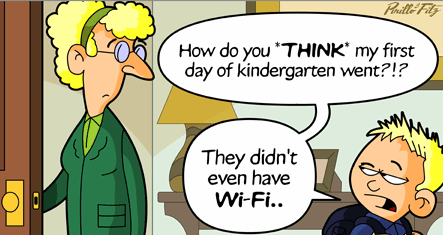For three years we have studied different theories that explain why communication should be our teaching goal. Now, if we really want our students to communicate, we cannot avoid including digital literacies in the classroom. In such a globalized world, where you can communicate so easily with whoever you want, wherever they are, technology becomes a device of everyday life. We cannot imagine our lives without technology – and yet we do not consider ourselves purely digital natives.
We should be aware that when students finish school, when they go out to the real world, they will need tools that nowadays, we are ignoring. “By integrating digital literacy work into our English classes, we can make them a little more relevant to who learners are once they are outside the school environment.” (Hockly, N. 2013)
 |
| Retrieved from https://www.edutopia.org/sites/default/files/styles/responsive_1240px/public/content/cc/parents-technology.gif?itok=GjGyUAbc×tamp=1397382476 |
Information Literacies
Information literacies, according to Hockly, is “the ability not only to find information amongst the mass of sites and sources afforded by technologies, but also to evaluate that information” (Hockly, N. 2013).
If we are to include digital literacies in the classroom, we have to bear in mind that you can find endless webpages on Internet, and not all of them are good sources, or provide correct information. That is why, we should learn, first ourselves and then teach our students how to distinguish a serious webpage from one that is not.
A website page we have analyzed was Discovery Education. It is an educational website which aims to be a tool for English teachers designing materials to use with their students.
On this website teachers can choose the content and topics according to their students’ age, developmental level and needs. What the page provides are different kinds of games/activities for teachers to use with the specific content chosen.
We have created a word search in which the students, after listening to a story about an animal band, will have to find animals and their instruments.
Find the animals and their instruments
T J W D S N M G K F H J H E Z
U N Q N N Y A G T O E E E A B
U W A O W L R Y E P F C A P Z
B K S H Z T A H N U R T U S U
E A N G P H C M I M O N K E Y
H L J U E E A U R R Z U W A O
H T I Z I F L R A A E U S T V
L I H S T O M E L V S E E N K
F Z G W G A I Y C R L P Y X U
I Q V G M U T C Z A M L L U E
N W U J H S I B L U U D F E I
Q S A A A R C T R E N X R P U
O N A I P B A T A Q O X N A M
I I O G C J R E H R I W K R B
Q H S J V P K O B N L V Y N E
BEAR
CLARINET
ELEPHANT
GUITAR
LION
MARACA
MONKEY
PIANO
SNAKE
TRUMPET
Another positive aspect of the website is that the information is clearly presented. The text is neat, legible and formatted for easy reading. The steps to follow to create the different activities are clearly stated and well-organized. However, teachers cannot download the activities directly in PDF. They have to print them directly from the page or, in the case they can't do that, they have to copy and paste it in a word document.
Sources:
- Hockly, N. (n.d.). Digital literacies: What are they and why should we care? Retrieved July 05, 2016, from https://www.teachingenglish.org.uk/article/digital-literacies-what-are-they-why-should-we-care
